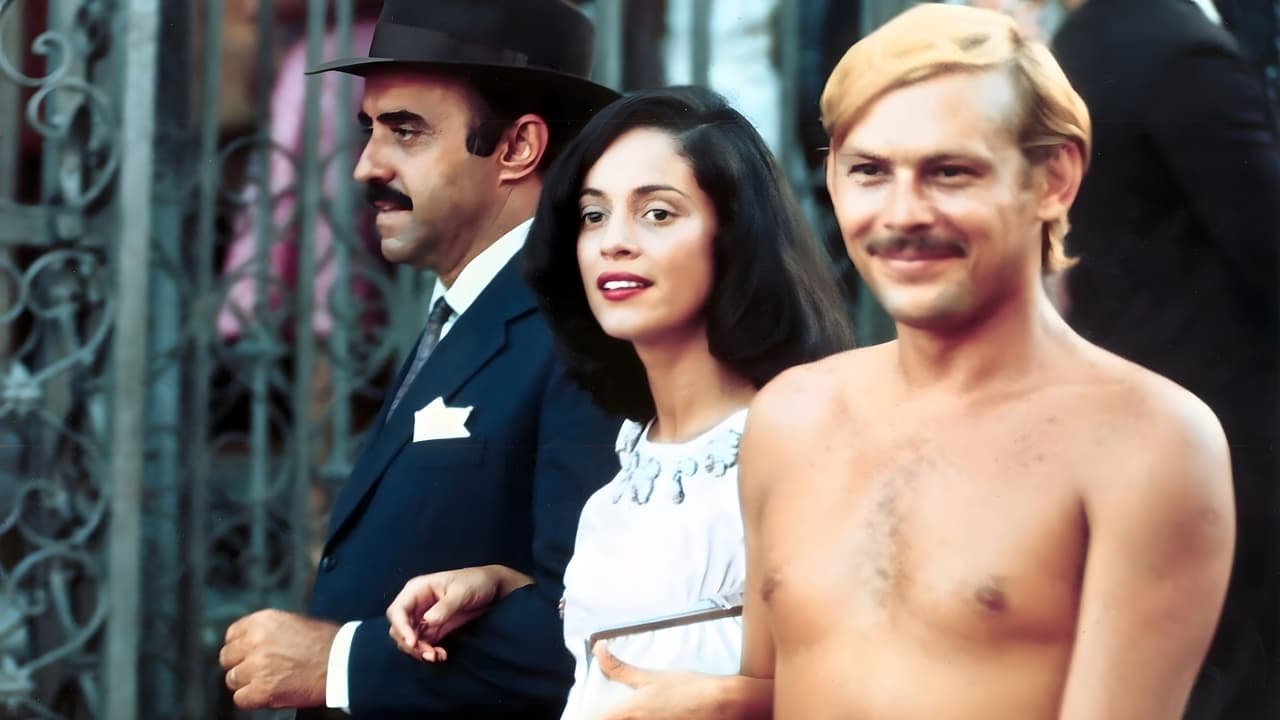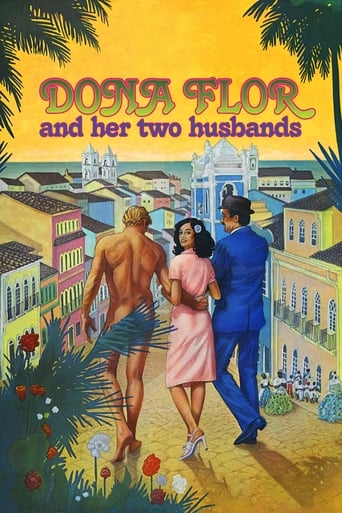



Overrated
Charming and brutal
It's fun, it's light, [but] it has a hard time when its tries to get heavy.
View MoreThe film's masterful storytelling did its job. The message was clear. No need to overdo.
View MoreTalking about prodigy filmmakers, Xavier Dolan might feel threatened, at the age of 21, Brazilian director Bruno Barreto's third feature DONA FLOR AND HER TWO HUSBANDS (adapted from Jorge Amado's namesake novel), became the most successful film in Brazilian history, a record it would retain for about 35 years, and it launched its star Sonia Braga onto international stardom, who would reach the apogee in her iconic turn in KISS OF THE SPIDER MAN (1985, 9/10) as the embodiment of the titular spider woman. Death precipitately befalls during the exotic festivity of a cluster of people dancing and courting a mulatto in a Brazilian town, and the deceased is Vadinho (Wilker), a young man in his early thirties, and the causes of his death are multiple. He is survived by his wife Dona Flora (Braga), and she starts to recollect their seven-year marriage and it turns out Vadinho is a complete good-for-nothing except his amorous sexual desire. He is a chronic gambler, an inherent womaniser, a boozer and whore-monger with a tendency for domestic violence. And Dona is a sultry beauty, but also a religious wife, she puts up with him in spite of all the suffering and abuse, since occasionally she can find the ephemeral satisfaction in their torrid love-making. But in the eyes of others, like Dona's mother and her close friends, who keep grousing about why she is so submissive towards Vadinho's tyranny, their marriage is a total mismatch judging by the face value. When Vadinho is out of the picture, everyone is hoping for a new bright future for Dona, including herself, she is tormented by his sudden death, but is also looking forward to commencing a brand new chapter of her life. So she marries to a second husband, a middle-age pharmacist Teodoro (Mendonça), the exact opposite of Vadinho, a respectful man with a prospective future, but pedantic and boring, and worst of all, the sex is dreadful, comically marked out by Barreto in their wedding consummation with droll earnestness. Commendably, the film focuses on a woman's conundrum between two polarised types of men, edifies with the motto "happiness does not equal romance" and then establishes Dona as a token of woman's sexual liberation by creating an imaginary ménage-a-trois situation with no rationale behind it. Barreto affirmatively betrays his young age through mischievousness of twisting the irony of fate and whimsies in engineering its saucy sex scenes with inordinate indulgence. Especially Wilker is not such a hotrod gaging by today's standard, watching him flaunt his flabby body in the buff and ca-noodle Braga again and again only solidifies one thing: she deserves someone much better, and the exploitation of her sex appeal out-paces the requirement for a committed performance, which she invests profoundly in the character development. As far as the film is concerned, although sometimes verbosely executed, but who can resist its fetching charm of a strange land with all its whistles and bells function in full mode, plus a hindsight of Barreto's young age can only attribute more to his precocious expertise, a creditable achievement indeed.
View MoreThis priceless old film contains brilliant performances, not only by the great Sonia Braga, and the Moliere Award-winning Jose Wilker, but also by the entire supporting cast.The gossipy neighbors, the uptight mother, the casino and whorehouse friends of Vadinho, are all played to absolute perfection! Mauro Mendonça deserves honorable mention for his spot-on portrayal of the bassoon-playing dork of a second husband. I've seen this at least a dozen times, and I still can't stop laughing.Few films create a masterpiece out of a masterpiece of fiction, which both this film and Jorge Amado's novel certainly are. Here, you get not only erotic art, but a hilarious and splendid comedy of manners, in a fantastic period setting, perfect in every detail. If that were not enough, the soundtrack of Francis Hime and Chico Buarque de Hollanda, with the theme song, "O que sera sera," sung by the great Simone, serves you an auditory feast worthy of Dona Flor's immortal moqueca.A treasure to savor, over and over and over again!
View MoreSonia Braga's beauty and charm is sure to captivate most male viewers of this film, but even they will probably notice that the whole thing DRAGS along at a slow-as-molasses pacing and feels incomplete, as if the filmmakers couldn't come up with a truly satisfying ending. The basic story is clever, but I'm afraid this film too often borders on boredom. (**1/2)
View MoreDona Flor, Sonia Braga, ( The Kiss of the Spider Woman and Robert Redford; Milagro Beanfield War) is married to Vadinho, José Wilker ( well known Brazilian Soapopera star). Vadinho likes women and Flor is a subservient wife who gives cooking lessons because she is well known in town for her good cooking. Vadinho never misses a chance to flirt and even to touch other women in front of Flor, who never catches him. Flor is great denial because she loves him and they have a great sex life. Vadinho dies. She remarries the town pharmacist, Mauro Mendonça (another famous Soap opera actor) who is a complete prude. Vadinho then begins to show up as a ghost, and keeps making fun of her prude husband. Well many funny moments of great laughter. Based on a book by Jorge Amado, one of the foremost Brazilian writers ( Gabriela, Cravo e Canela), this is a fun plot and very much into the Brazilian culture. You must give Vadinho a break at the beginning of the movie because machismo is somewhat accepted in the Latin culture, and as the plot develops his machismo will make you laugh. Well directed by Bruno Barreto, who directed ( Four Days in September) movie that was nominated for an Oscar as Best Foreign Film in 1988, Dona Flor will give great insights into Brazilian culture and a flavor to taste Brazilian food. Very spice, and fun Movie. I highly recommend!
View More